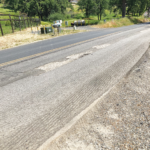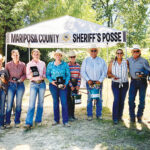
Law Enforcement is handcuffed in dealing with illegal aliens
By R.D Tucker
Because of Senate Bill 54 (SB54), which was passed by the California State Senate in 2018, law enforcement officials across the state have been handcuffed by the state’s legislators. Even though the floodgates at California’s southern border with Mexico have been opened wide by the federal and state governments, law enforcement officials remain hamstrung in dealing with people who have crossed the border illegally.
Thanks to that measure, local law enforcement can’t contact or inform Immigration and Customs Enforcement (ICE) when they detain illegal, undocumented individuals for violations of the law, except in extreme cases.
With the increase of immigrants streaming into the state, which prior to the current federal administration was more like a trickle than a cloudburst, law enforcement officers are concerned about the “unknown” elements.
“My greatest concern is the impact of the unknown,” said Mariposa County Sheriff Jeremy Briese. “There are kind of two sides to this story. There are good people who get victimized in the process of getting them across the border. They are easy targets for the cartels. But the unknown is extremely nerve wracking,” Briese explained.
“What we’re seeing in law enforcement with the undocumented folks our deputies come in contact with is a complete inability to identify who we’re dealing with. Say they get in trouble in Fresno or Madera County, then they transfer over to Mariposa County. When they come in contact with us, they give different names or aliases, so we can have individuals that have multiple warrants out for their arrest, but without doing a “livescan” we don’t know who we’re dealing with. That’s the unnerving aspect of the unknown,” Briese said.
Briese mentioned a case that occurred just after he came into office when there was a shootout in a marijuana garden at the bottom of Stumpfield Mountain Road. One gardener was killed, and the shooter escaped, only to be apprehended in the Modesto area. “If I remember right that guy had 10 or 12 aliases, so a lot of times, were in the dark as to who we’re interfacing with,” he said.
Law enforcement’s concern was exacerbated by a recent ruling from a federal Judge in Chicago. According to information released by The Epoch Times, an illegal immigrant was wrongly banned from possessing firearms, according to the recent ruling.
U.S. District Judge Sharon Johnson Coleman, and Obama appointee, rejected two motions to dismiss from the immigrant’s attorneys, but the third motion, based on a 2022 U.S. Supreme Court ruling, triggered the dismissal of the case on March 8. Lawyers for the subject illegal immigrant, Mr. Carbajal-Flores, had argued in the most recent motion to dismiss that the government could not show that the law in question was “part of the historical tradition that delimits the outer bounds of the right to keep and bear arms.” The ruling is expected to be appealed by the government, but this ruling now stands, allowing illegal immigrants to possess firearms.
The “livescan” process helps identify individuals, primarily by fingerprints, who may be wanted in other jurisdictions. However, unless an individual is booked into the Mariposa County jail, the “livescan” process isn’t warranted.
If an undocumented person is arrested, the case is turned over to the district attorney’s office for prosecution. Unless the case involves a serious felony, the sheriff’s department is forbidden from contacting ICE or notifying them when a person charged with a crime is released from custody.
“Once they are convicted, they are housed in our jail, but we aren’t allowed to communicate with ICE if they are going to be released. We can only communicate with ICE if it’s a really violent type of crime. If it’s just normal state or local felony it goes through the normal process, then they just go back on the streets. That kind of dove tails on what we’re dealing with in different alias,” Briese explained.
SB 54 reads, “Under no circumstances can local law enforcement cooperate with immigration authorities on individuals arrested, detained, or convicted of offenses that are misdemeanors under the code but were felonies or wobblers before the enactment of Proposition 47. In other words, in no case can local law enforcement cooperate with notice and transfer requests for people convicted of Proposition 47 offenses (Govt C §7282.5(a)(6)). It’s clear that no conviction that is classed as a misdemeanor under Proposition 47 can be the basis for cooperation with immigration. If a person is entitled to reduce a past felony conviction to a misdemeanor under Proposition 47 but has not yet done so, the better view is that the felony still cannot serve as a basis for cooperation with immigration authorities. However, because of the potential for mixed application on the ground, counsel should make every effort to reduce prior felonies to misdemeanors under Proposition 47. If the conviction is from another county, counsel should contact the public defender or other defense counsel in that county to ask them to reduce the felony under Proposition 47.”
The law, which was approved in January of 2018, enumerates a few exceptions, but in most cases, law enforcement has very little latitude in dealing with illegal aliens.
Sheriff Briese was asked by The Mariposan, “Has there been an increase in contacts made by your officers with illegal aliens, and is that based on traffic stops of other violations?”
The sheriff responded, “I think we are pretty stable right now. We haven’t seen a dramatic increase yet in these low-level crimes, but I think, based on sheer numbers coming across the border, we’re going to see an increase. They’ve got to go somewhere. If you really follow human trafficking, it’s really crazy. Cartels are forcing them to work, or traffic drugs. They think they are going to San Diego, and they end up in Atlanta.”
The California Highway Patrol is in the same restrictive boat. Officer Steven Mullen said, “If they have nothing to show, they get assigned an “X” number, and that stays with that person. We fingerprint them and from that day on that number stays with them as well as all their descriptors. That gets sent to the court the same way and it’s out of our hands at that point. Unless we’re booking them, we just do a thumb print on the side of the road, and they are pretty much free to go.”
With the county’s budget shortfall, do you anticipate any problems with your deputies being able to provide the patrol levels that county residents are accustomed to, and will that effect the discovery of unlicensed illegal aliens on the roadways or conducting marijuana grows, Sheriff Briese was asked?
“The immediate answer would be yes. We are reducing responding to calls to a certain period of time, but that can impact the proactive patrol measures as we are trying to get through this year’s budget. Some of that can affect our investigation into illegal grows and other issues that are outside of our normal patrol response,” Briese replied.
“It’s good to bring awareness to this situation. We aren’t on an island somewhere in California,” Briese concluded.


















